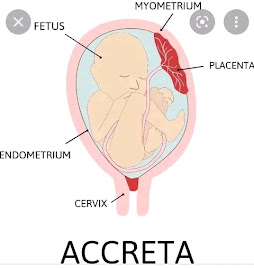PLACENTAL ACCRETA, INCRETA AND PERCRETA

PLACENTAL ACCRETA, INCRETA AND PERCRETA The placenta is an organ that develops in your uterus during pregnancy. This structure provides oxygen and nutrients to your growing baby and removes waste products from your baby's blood. The placenta attaches to the wall of your uterus, and your baby's umbilical cord arises from it. Normally, the placenta grows onto the upper part of the uterus (endometrium) and stays there until your baby is born. Sometimes the placenta attaches itself into the wall of the uterus too deeply. This can cause problems, including; ✓Placenta accreta Placenta accreta is a serious pregnancy condition that occurs when the placenta grows too deeply into the uterine wall. Typically, the placenta detaches from the uterine wall after childbirth. With placenta accreta, part or all of the placenta remains attached. This can cause severe blood loss after delivery. ✓Placenta increta The placenta attaches itself even more deeply into the muscle wall of the uterus. ✓P...